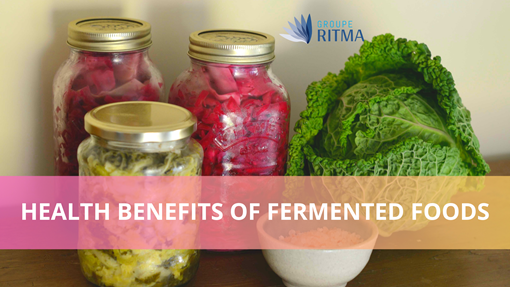
Chronicles
16 August 2023
The Health Benefits of Fermented Foods

Since ancient times, foods such as sour milk and sauerkraut have been an integral part of the human diet through the process of fermentation. Fermentation, one of the oldest methods of processing and preserving food, offers an array of nutritional benefits. Fermented vegetables, for example, are richer in vitamins than their fresh counterparts. All fermented products are also more easily digestible. They lead to a decrease in components that are difficult to digest, such as the sugar in kefir or the lactose in cheeses and yoghurts. Therefore, if a richly stuffed sauerkraut feels heavy on the stomach, it's actually because of the meat and fat, not the fermented cabbage itself.
The importance of fermented foods in the balance of the intestinal microbiota
The consumption of fermented foods plays a key role in maintaining the balance between the different families of bacteria present in the intestinal microbiota. It is crucial to favor the original food rather than its encapsulated version on sale in pharmacies. It is recommended to consume these products two to three times a week for healthy individuals.
Not all types of fermentation are suitable for everyone
It is important to note that not all types of fermentation, such as lacto-fermentation, alcoholic, acetic and alkaline fermentation, are suitable for every individual. Very thin people, or those whose gut microbiota is weakened by malabsorption due to excessive exposure to antibiotics or acne treatments, may become sensitive to the acidity and vinegar produced by these foods. They risk suffering from irritation caused by these acidic and vinegary foods. People with Sibo (bacterial overgrowth in the small intestine) or candidiasis (fungal infection) should also avoid these foods, as their body may overreact to contact with these foods.
Moderate and balanced consumption recommended
Fermented foods may also help improve other health conditions such as ulcers, anemia, eczema, constipation, diarrhea, and certain liver vulnerabilities. It is essential to consume these foods as part of a balanced diet. A fundamental rule to remember: “You must eat everything in moderation.’’
To buy or to prepare yourself
Milk or fruit kefir, pickled vegetables, sourdough bread, sauerkraut, kimchi (a Korean specialty), kombucha (a sour drink), miso soup and raw milk cheese are all products where fermentation plays a crucial role. These products are easily available in supermarkets or organic stores. They can also be made at home. Lactofermentation is really simpler than it sounds. You can get started right away from the vegetables at your disposal! The many benefits of Lactofermentation are at your fingertips. Find out more here: https://revolutionfermentation.com/fra/blogs/legumes-fermentes/comment-fermenter-legumes-lacto-fermentation/